美国总统大选第二场电视辩论
- 格式:docx
- 大小:103.12 KB
- 文档页数:70
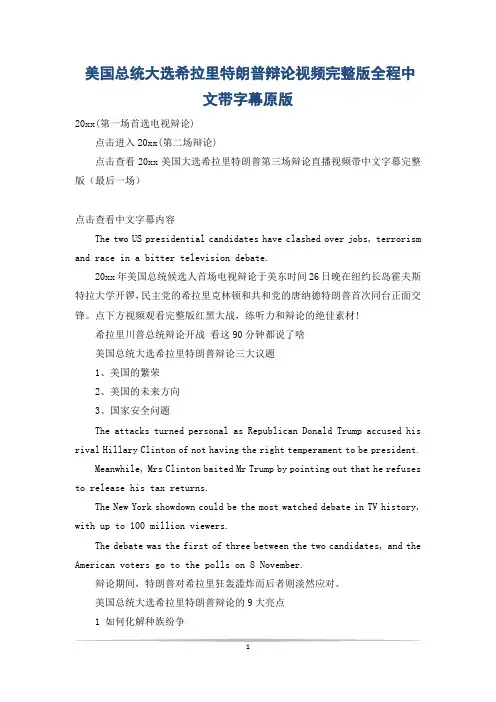
美国总统大选希拉里特朗普辩论视频完整版全程中文带字幕原版20xx(第一场首选电视辩论)点击进入20xx(第二场辩论)点击查看20xx美国大选希拉里特朗普第三场辩论直播视频带中文字幕完整版(最后一场)点击查看中文字幕内容The two US presidential candidates have clashed over jobs, terrorism and race in a bitter television debate.20xx年美国总统候选人首场电视辩论于美东时间26日晚在纽约长岛霍夫斯特拉大学开锣,民主党的希拉里克林顿和共和党的唐纳德特朗普首次同台正面交锋。
点下方视频观看完整版红黑大战,练听力和辩论的绝佳素材!希拉里川普总统辩论开战看这90分钟都说了啥美国总统大选希拉里特朗普辩论三大议题1、美国的繁荣2、美国的未来方向3、国家安全问题The attacks turned personal as Republican Donald Trump accused his rival Hillary Clinton of not having the right temperament to be president. Meanwhile, Mrs Clinton baited Mr Trump by pointing out that he refuses to release his tax returns.The New York showdown could be the most watched debate in TV history, with up to 100 million viewers.The debate was the first of three between the two candidates, and the American voters go to the polls on 8 November.辩论期间,特朗普对希拉里狂轰滥炸而后者则淡然应对。
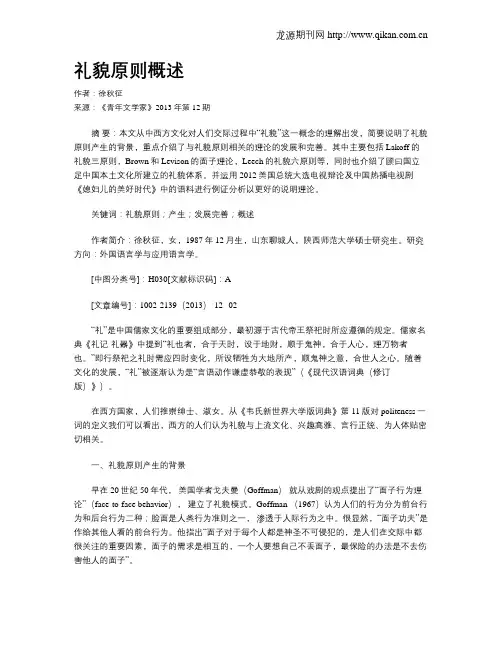
礼貌原则概述作者:徐秋征来源:《青年文学家》2013年第12期摘要:本文从中西方文化对人们交际过程中“礼貌”这一概念的理解出发,简要说明了礼貌原则产生的背景,重点介绍了与礼貌原则相关的理论的发展和完善。
其中主要包括Lakoff的礼貌三原则,Brown和Levison的面子理论,Leech的礼貌六原则等,同时也介绍了顾曰国立足中国本土文化所建立的礼貌体系。
并运用2012美国总统大选电视辩论及中国热播电视剧《媳妇儿的美好时代》中的语料进行例证分析以更好的说明理论。
关键词:礼貌原则;产生;发展完善;概述作者简介:徐秋征,女,1987年12月生,山东聊城人,陕西师范大学硕士研究生。
研究方向:外国语言学与应用语言学。
[中图分类号]:H030[文献标识码]:A[文章编号]:1002-2139(2013)-12--02“礼”是中国儒家文化的重要组成部分,最初源于古代帝王祭祀时所应遵循的规定。
儒家名典《礼记·礼器》中提到“礼也者,合于天时,设于地财,顺于鬼神,合于人心,理万物者也。
”即行祭祀之礼时需应四时变化,所设牺牲为大地所产,顺鬼神之意,合世人之心。
随着文化的发展,“礼”被逐渐认为是“言语动作谦虚恭敬的表现”(《现代汉语词典(修订版)》)。
在西方国家,人们推崇绅士、淑女。
从《韦氏新世界大学版词典》第11版对politeness一词的定义我们可以看出,西方的人们认为礼貌与上流文化、兴趣高雅、言行正统、为人体贴密切相关。
一、礼貌原则产生的背景早在20世纪50年代,美国学者戈夫曼(Goffman)就从戏剧的观点提出了“面子行为理论”(face-to-face behavior),建立了礼貌模式。
Goffman (1967)认为人们的行为分为前台行为和后台行为二种;脸面是人类行为准则之一,渗透于人际行为之中。
很显然,“面子功夫”是作给其他人看的前台行为。
他指出“面子对于每个人都是神圣不可侵犯的,是人们在交际中都很关注的重要因素,面子的需求是相互的,一个人要想自己不丢面子,最保险的办法是不去伤害他人的面子”。
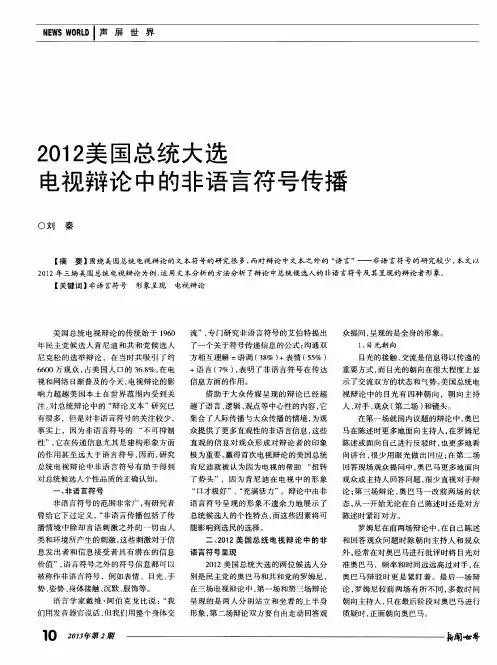
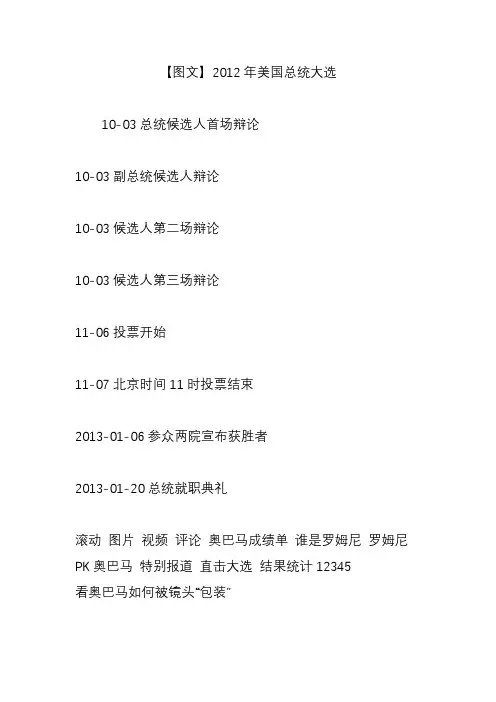
【图文】2012年美国总统大选10-03总统候选人首场辩论10-03副总统候选人辩论10-03候选人第二场辩论10-03候选人第三场辩论11-06投票开始11-07北京时间11时投票结束2013-01-06参众两院宣布获胜者2013-01-20总统就职典礼滚动图片视频评论奥巴马成绩单谁是罗姆尼罗姆尼PK奥巴马特别报道直击大选结果统计12345看奥巴马如何被镜头“包装”新闻视频更多>>回顾:奥巴马执政的四年直击:奥巴马团队美国各州选情图更多>>11月6日,美国选民将投票选出新一届美国总统,目前大选正式进入投票阶段。
率先赢得270张选举人票者获胜。
图片万花筒更多>>时代封面上的国家表情美国总统从华盛顿到奥巴马,都是《时代周刊》封面上的常客,并形成一道独特的风景。
总统与狗| 选举中的巧合罗姆尼一家|秀场玩家奥巴马图表看大选更多>>社交媒体玩不转,大选难赢“早上起床时穿上裤子的回报是什么?我们不知道。
但我们知道,不这样做是不好的。
”2012年的竞选活动则已步入社交网站的深水区。
290票203票奥巴马获胜连任成功推特发文称“感谢” 评新华网最新快讯:美国总统奥巴马在11月6日(北京时间11月7日)举行的美国大选中获得超过270张选举人票,连任总统成定局。
[详细]策划:奥巴马的为官之道四年大考成绩单选民政治下,美国政界早已形成一套细致入微的为官“表演”之道,吃穿住行皆有讲究。
奥巴马,这个美国政界的“头号演员”有啥为官之道……[详细]奥巴马获胜消息美媒称奥巴马成功连任美总统将发表获胜演讲奥巴马笑谈《江南style》或私下给妻子跳(图)一个美国中产家庭大选投票:"当然是奥巴马"奥巴马在重要摇摆州获胜奠定胜选基础(图)一路上他这样走来第一任期内总统人生经历选情消息奥罗最后一刻转战网络社交媒体抢选票6成选民称最关注经济民调存“死穴” 选情变数大罗姆尼自曝只准备胜选演说奥巴马备好两份获胜演说选民不满:奥执政很糟罗姆尼被批“最为虚弱的诺言”大选花絮独家:奥巴马的秘诀会讲故事接地气擅抓民心奥巴马结束最后竞选活动回忆往昔泣不成声(图)4岁女童痛哭称受够美国大选网民盼早日结束奥巴马减少女儿曝光率两千金缺席最后拉票(图)小男孩与奥巴马合照时强吻女同学抢总统风头(图)分析评论秦升祺:奥巴马连任中国更有利大西洋周刊:为何共和党应对罗姆尼当总统心存恐惧华媒评美大选:无论谁当选中美关系基本格局不变FBI与美总统"为敌"近百年总统常处于下风孙哲:美国大选呈现两大特点折射其国家分裂严重美国学者:美国未来对外政策应注重对话与合作290票290票201票203票选情瞭望塔更多>>奥巴马这四年都做了啥?过去四年里,美国勉强度过经济危机,却依旧深陷泥潭。
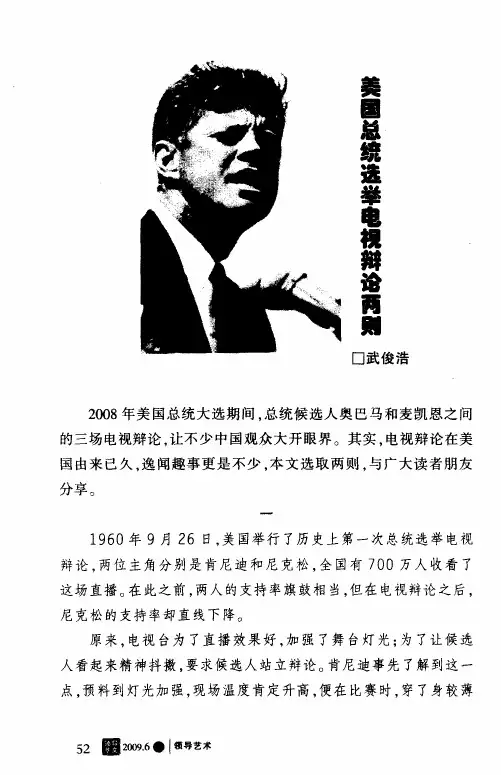
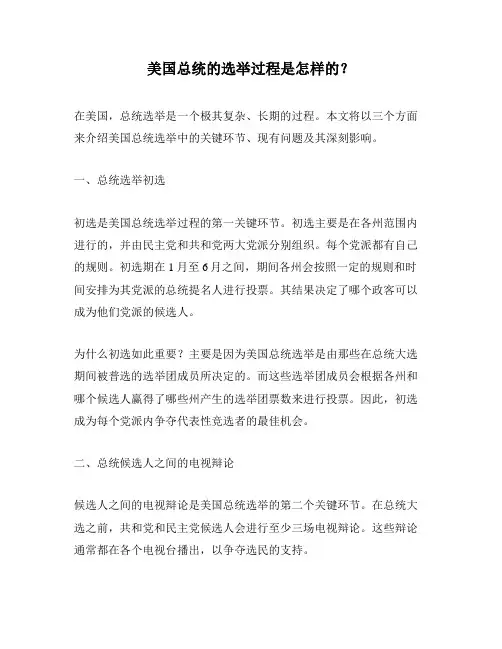
美国总统的选举过程是怎样的?在美国,总统选举是一个极其复杂、长期的过程。
本文将以三个方面来介绍美国总统选举中的关键环节、现有问题及其深刻影响。
一、总统选举初选初选是美国总统选举过程的第一关键环节。
初选主要是在各州范围内进行的,并由民主党和共和党两大党派分别组织。
每个党派都有自己的规则。
初选期在1月至6月之间,期间各州会按照一定的规则和时间安排为其党派的总统提名人进行投票。
其结果决定了哪个政客可以成为他们党派的候选人。
为什么初选如此重要?主要是因为美国总统选举是由那些在总统大选期间被普选的选举团成员所决定的。
而这些选举团成员会根据各州和哪个候选人赢得了哪些州产生的选举团票数来进行投票。
因此,初选成为每个党派内争夺代表性竞选者的最佳机会。
二、总统候选人之间的电视辩论候选人之间的电视辩论是美国总统选举的第二个关键环节。
在总统大选之前,共和党和民主党候选人会进行至少三场电视辩论。
这些辩论通常都在各个电视台播出,以争夺选民的支持。
接下来,我们来看看为什么电视辩论是那么重要的。
首先,这是候选人直接向选民展示自己和他们的政策和观点的机会。
其次,这个环节能够让选民更全面地了解候选人和他们的承诺、观点以及看待过去政府管理的方式。
事实上,候选人在电视辩论中的表现往往是选民考虑的一个重要因素。
三、总统大选总统大选是美国总统选举的核心环节。
总统大选通常发生在11月的第一个星期二,各州选民在同一天投票,选举团也会在数日内将其得票情况通报给国会。
总统大选制度中有一项叫做“选举人制度”。
这意味着,每个州的选民将投票给代表各自州的选举团成员来代表他们进行投票。
总共有538个选举团成员。
让任何一个候选人赢得总统大选,他必须赢得在选举团中至少270票的支持。
总统大选是美国总统选举过程中最重要、最终的环节。
它代表着全国选民的意愿。
如果某个候选人赢得总共538个选举团成员的支持,那么他就将成为美国第46届总统。
总结总统选举是美国国家事务的核心,也是美国每日政治生活的重要组成部分。
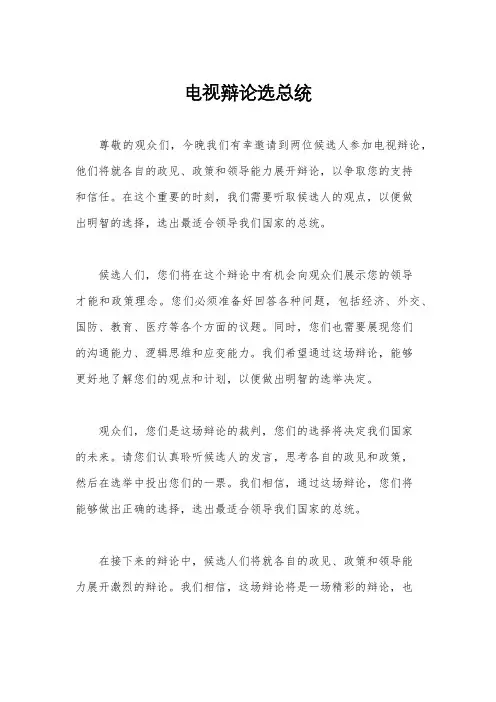
电视辩论选总统
尊敬的观众们,今晚我们有幸邀请到两位候选人参加电视辩论,他们将就各自的政见、政策和领导能力展开辩论,以争取您的支持
和信任。
在这个重要的时刻,我们需要听取候选人的观点,以便做
出明智的选择,选出最适合领导我们国家的总统。
候选人们,您们将在这个辩论中有机会向观众们展示您的领导
才能和政策理念。
您们必须准备好回答各种问题,包括经济、外交、国防、教育、医疗等各个方面的议题。
同时,您们也需要展现您们
的沟通能力、逻辑思维和应变能力。
我们希望通过这场辩论,能够
更好地了解您们的观点和计划,以便做出明智的选举决定。
观众们,您们是这场辩论的裁判,您们的选择将决定我们国家
的未来。
请您们认真聆听候选人的发言,思考各自的政见和政策,
然后在选举中投出您们的一票。
我们相信,通过这场辩论,您们将
能够做出正确的选择,选出最适合领导我们国家的总统。
在接下来的辩论中,候选人们将就各自的政见、政策和领导能
力展开激烈的辩论。
我们相信,这场辩论将是一场精彩的辩论,也
将是一场对我们国家未来的重要讨论。
让我们一起期待这场辩论的精彩表现,同时也期待着您们的明智选择。
谢谢!。
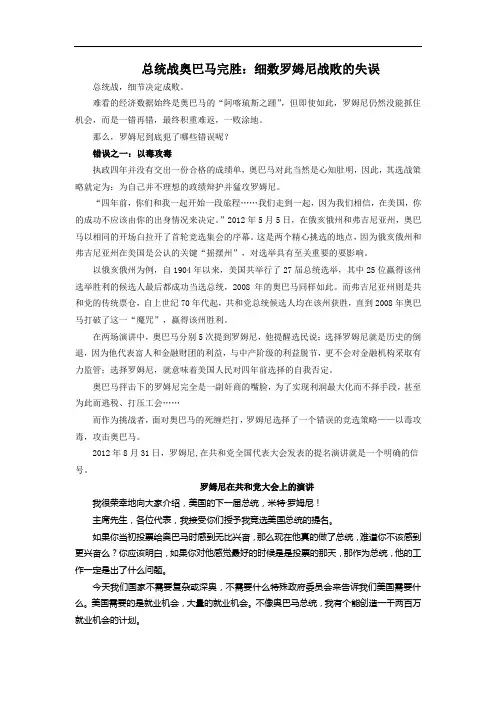
总统战奥巴马完胜:细数罗姆尼战败的失误总统战,细节决定成败。
难看的经济数据始终是奥巴马的“阿喀琉斯之踵”,但即使如此,罗姆尼仍然没能抓住机会,而是一错再错,最终积重难返,一败涂地。
那么,罗姆尼到底犯了哪些错误呢?错误之一:以毒攻毒执政四年并没有交出一份合格的成绩单,奥巴马对此当然是心知肚明,因此,其选战策略就定为:为自己并不理想的政绩辩护并猛攻罗姆尼。
“四年前,你们和我一起开始一段旅程……我们走到一起,因为我们相信,在美国,你的成功不应该由你的出身情况来决定。
”2012年5月5日,在俄亥俄州和弗吉尼亚州,奥巴马以相同的开场白拉开了首轮竞选集会的序幕。
这是两个精心挑选的地点,因为俄亥俄州和弗吉尼亚州在美国是公认的关键“摇摆州”,对选举具有至关重要的要影响。
以俄亥俄州为例,自1904年以来,美国共举行了27届总统选举,其中25位赢得该州选举胜利的候选人最后都成功当选总统,2008年的奥巴马同样如此。
而弗吉尼亚州则是共和党的传统票仓,自上世纪70年代起,共和党总统候选人均在该州获胜,直到2008年奥巴马打破了这一“魔咒”,赢得该州胜利。
在两场演讲中,奥巴马分别5次提到罗姆尼,他提醒选民说:选择罗姆尼就是历史的倒退,因为他代表富人和金融财团的利益,与中产阶级的利益脱节,更不会对金融机构采取有力监管;选择罗姆尼,就意味着美国人民对四年前选择的自我否定。
奥巴马抨击下的罗姆尼完全是一副奸商的嘴脸,为了实现利润最大化而不择手段,甚至为此而逃税、打压工会……而作为挑战者,面对奥巴马的死缠烂打,罗姆尼选择了一个错误的竞选策略——以毒攻毒,攻击奥巴马。
2012年8月31日,罗姆尼,在共和党全国代表大会发表的提名演讲就是一个明确的信号。
罗姆尼在共和党大会上的演讲我很荣幸地向大家介绍,美国的下一届总统,米特〃罗姆尼!主席先生,各位代表,我接受你们授予我竞选美国总统的提名。
如果你当初投票给奥巴马时感到无比兴奋,那么现在他真的做了总统,难道你不该感到更兴奋么?你应该明白,如果你对他感觉最好的时候是是投票的那天,那作为总统,他的工作一定是出了什么问题。
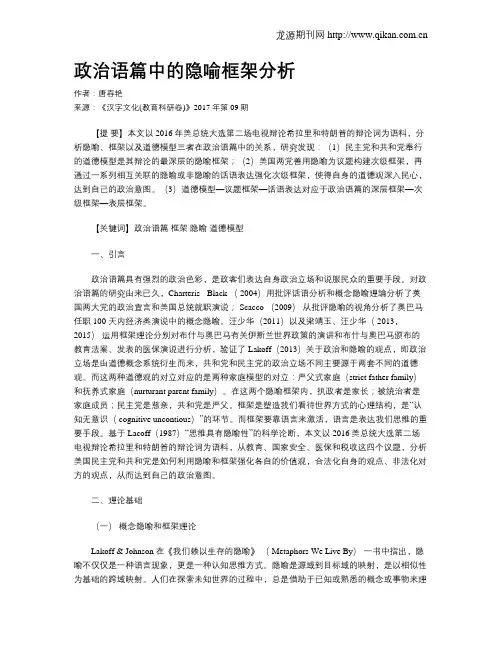
政治语篇中的隐喻框架分析作者:唐春艳来源:《汉字文化(教育科研卷)》2017年第09期【提要】本文以2016年美总统大选第二场电视辩论希拉里和特朗普的辩论词为语料,分析隐喻、框架以及道德模型三者在政治语篇中的关系,研究发现:(1)民主党和共和党奉行的道德模型是其辩论的最深层的隐喻框架;(2)美国两党善用隐喻为议题构建次级框架,再通过一系列相互关联的隐喻或非隐喻的话语表达强化次级框架,使得自身的道德观深入民心,达到自己的政治意图。
(3)道德模型—议题框架—话语表达对应于政治语篇的深层框架—次级框架—表层框架。
【关键词】政治语篇框架隐喻道德模型一、引言政治语篇具有强烈的政治色彩,是政客们表达自身政治立场和说服民众的重要手段。
对政治语篇的研究由来已久,Charteris - Black ( 2004)用批评话语分析和概念隐喻理論分析了英国两大党的政治宣言和美国总统就职演说; Scacco (2009)从批评隐喻的视角分析了奥巴马任职 100 天内经济类演说中的概念隐喻。
汪少华(2011)以及梁靖玉、汪少华( 2013,2015)运用框架理论分别对布什与奥巴马有关伊斯兰世界政策的演讲和布什与奥巴马颁布的教育法案、发表的医保演说进行分析,验证了 Lakoff(2013)关于政治和隐喻的观点,即政治立场是由道德概念系统衍生而来,共和党和民主党的政治立场不同主要源于两套不同的道德观。
而这两种道德观的对立对应的是两种家庭模型的对立:严父式家庭(strict father family)和抚养式家庭(nurturant parent family)。
在这两个隐喻框架内,执政者是家长;被统治者是家庭成员;民主党是慈亲,共和党是严父。
框架是塑造我们看待世界方式的心理结构,是“认知无意识( cognitive uncontious)”的环节。
而框架要靠语言来激活,语言是表达我们思维的重要手段。
基于Lacoff(1987)“思维具有隐喻性”的科学论断,本文以2016美总统大选第二场电视辩论希拉里和特朗普的辩论词为语料,从教育、国家安全、医保和税收这四个议题,分析美国民主党和共和党是如何利用隐喻和框架强化各自的价值观,合法化自身的观点、非法化对方的观点,从而达到自己的政治意图。
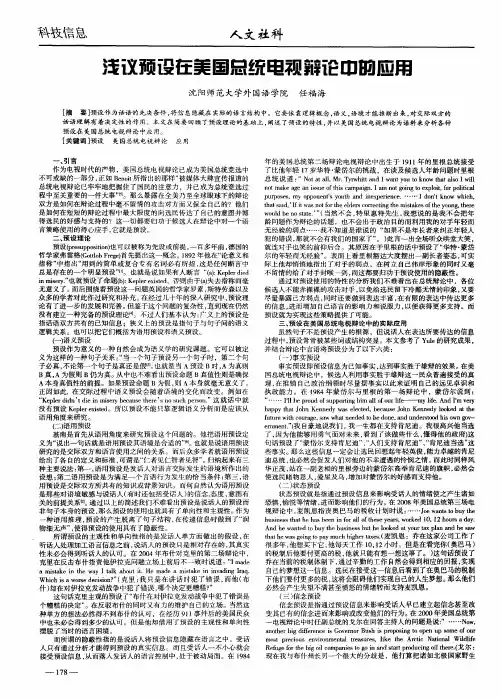
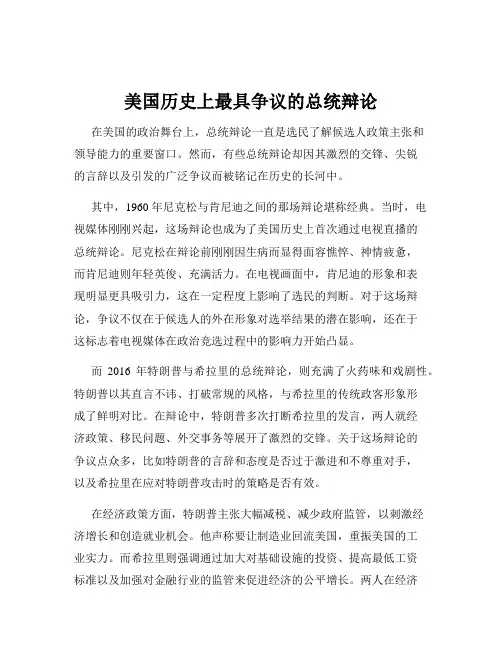
美国历史上最具争议的总统辩论在美国的政治舞台上,总统辩论一直是选民了解候选人政策主张和领导能力的重要窗口。
然而,有些总统辩论却因其激烈的交锋、尖锐的言辞以及引发的广泛争议而被铭记在历史的长河中。
其中,1960 年尼克松与肯尼迪之间的那场辩论堪称经典。
当时,电视媒体刚刚兴起,这场辩论也成为了美国历史上首次通过电视直播的总统辩论。
尼克松在辩论前刚刚因生病而显得面容憔悴、神情疲惫,而肯尼迪则年轻英俊、充满活力。
在电视画面中,肯尼迪的形象和表现明显更具吸引力,这在一定程度上影响了选民的判断。
对于这场辩论,争议不仅在于候选人的外在形象对选举结果的潜在影响,还在于这标志着电视媒体在政治竞选过程中的影响力开始凸显。
而2016 年特朗普与希拉里的总统辩论,则充满了火药味和戏剧性。
特朗普以其直言不讳、打破常规的风格,与希拉里的传统政客形象形成了鲜明对比。
在辩论中,特朗普多次打断希拉里的发言,两人就经济政策、移民问题、外交事务等展开了激烈的交锋。
关于这场辩论的争议点众多,比如特朗普的言辞和态度是否过于激进和不尊重对手,以及希拉里在应对特朗普攻击时的策略是否有效。
在经济政策方面,特朗普主张大幅减税、减少政府监管,以刺激经济增长和创造就业机会。
他声称要让制造业回流美国,重振美国的工业实力。
而希拉里则强调通过加大对基础设施的投资、提高最低工资标准以及加强对金融行业的监管来促进经济的公平增长。
两人在经济政策上的分歧引发了广泛的讨论和争议,选民们对于哪种政策更能解决美国当时面临的经济困境各持己见。
移民问题也是这场辩论中的一个焦点。
特朗普提出要在美墨边境修建隔离墙,以阻止非法移民的涌入,并主张对移民采取严格的审查和限制措施。
他的言论引发了移民群体和人权组织的强烈反对,认为这种做法不人道且不符合美国的价值观。
希拉里则主张通过改革移民制度,为非法移民提供获得合法身份的途径,并强调移民对美国经济和社会的贡献。
这一议题的激烈辩论反映了美国社会在移民问题上的深刻分歧和对立。
杨安泽:想做“华裔奥巴马”作者:暂无来源:《读报参考》 2019年第28期杨安泽是美国2020年总统选举民主党初选中的另类。
当其他民主党竞选人还在讨论移民政策、气候协定、税收改革时,杨安泽却喊出“人性至上”的口号,并主张联邦政府每月给每个18-64岁的美国人发放1000美元的“自由红利”。
他是第一名成功进入党内辩论阶段的华裔候选人,已经得到了足够的支持,也引起了许多关注。
“哥特总统”7月31日晚8点,民主党第二轮电视辩论的第二场在底特律市上演。
10名竞选人同台辩论,其中包括杨安泽,他是全场唯一一名没有打领带的男性候选人。
辩论进行到一半,主持人突然转向杨安泽:“民调显示,对于民主党选民而言,他们想要一名能击败特朗普总统的候选人。
而根据现在的民调,最有可能实现这一目标的是拜登。
对此,你怎么看?”导播将拜登和杨安泽同时切进画面,老练的拜登轻轻一笑,杨安泽神情严肃,立即接招。
“我正在建立一个联盟,包括当初投票给特朗普的选民、无党派人士、自由派和保守派,以及民主党的温和派和进步派。
我相信我就是那名能击败特朗普的候选人。
”杨安泽说,特朗普发现了美国社会的失业问题,却找错了解决方法。
特朗普把一切问题归咎于移民,赢得失业工人的支持,才赢得了大选。
但真正夺走美国人工作的不是移民,而是科技。
自动化和人工智能将导致大批美国人失业,比如,自动驾驶汽车可能导致100万名司机失业,售货员、接线员、快餐店店员也难以在这场失业潮中幸免。
特朗普的解决方法是建一堵墙,而杨安泽的解决方法是给每人发钱。
他主张联邦政府提供“全民基本收入”,给所有18-64岁的美国人每月发放1000美元的基本生活费,没有任何附加条件,以保证他们稳定的生活。
这一笔钱又称作“自由红利”。
他认为,这是人工智能时代的人性关怀。
而资金的来源便是从自动化和人工智能的发展中获益的科技企业们,例如亚马逊、苹果、奈飞等巨头。
这项大胆激进的政策获得了科技巨头马斯克的支持,他曾转发杨安泽的一条推文,并表示“我支持杨。
2012年美国总统大选电视辩论原文__BY crazyboyJIM LEHRER: Good evening from the Magness Arena at the University of Denver in Denver, Colorado. I'm Jim Lehrer of the PBS NewsHour, and I welcome you to the first of the 2012 presidential debates between President Barack Obama, the Democratic nominee, and former Massachusetts Governor Mitt Romney, the Republican nominee.This debate and the next three — two presidential, one vice- presidential —are sponsored by the Commission on Presidential Debates.Tonight's 90 minutes will be about domestic issues, and will follow a format designed by the commission. There will be six roughly 15-minute segments, with two-minute answers for the first question, then open discussion for the remainder of each segment. Thousands of people offered suggestions on segmentsubjects of questions via the Internet and other means, but I made the final selections, and for the record, they were not submitted for approval to the commission or the candidates.The segments, as I announced in advance, will be three on the economy and one each on health care, the role of government, and governing, with an emphasis throughout on differences, specifics and choices. Both candidates will also have two-minute closing statements.The audience here in the hall has promised to remain silent. No cheers, applause, boos, hisses —among other noisy distracting things —so we may all concentrate on what the candidates have to say. There is a noise exception right now, though, as we welcome President Obama and Governor Romney. (Cheers, applause.)Gentlemen, welcome to you both.Let's start the economy, segment one. And let's begin with jobs. What are the major differences between the two of you about how you would go about creating new jobs? You have two minutes —each ofyou have two minutes to start. The coin toss has determined, Mr. President, you go first.PRESIDENT BARACK OBAMA: Well, thank you very much, Jim, for this opportunity. I want to thank Governor Romney and the University of Denver for your hospitality.There are a lot of points that I want to make tonight, but the most important one is that 20 years ago I became the luckiest man on earth because Michelle Obama agreed to marry me. (Laughter.) And so I just want to wish, Sweetie, you happy anniversary and let you know that a year from now, we will not be celebrating it in front of 40 million people. (Laughter.)You know, four years ago we went through the worst financial crisis since the Great Depression. Millions of jobs were lost. The auto industry was on the brink of collapse. The financial system had frozen up. And because of the resilience and the determination of the American people, we've begun to fight our way back.Over the last 30 months, we've seen 5 million jobsin the private sector created. The auto industry has come roaring back and housing has begun to rise. But we all know that we've still got a lot of work to do. And so the question here tonight is not where we've been but where we're going. Governor Romney has a perspective that says if we cut taxes, skewed towards the wealthy, and roll back regulations that we'll be better off.I've got a different view. I think we've got to invest in education and training. I think it's important for us to develop new sources of energy here in America, that we change our tax code to make sure that we're helping small businesses and companies that are investing here in the United States, that we take some of the money that we're saving as we wind down two wars to rebuild America and that we reduce our deficit in a balanced way that allows us to make these critical investments. Now, it ultimately is going to be up to the voters, to you, which path we should take. Are we going to double down on the top-down economic policies that helped to get us into this mess, or do we embrace anew economic patriotism that says, America does best when the middle class does best? And I'm looking forward to having that debate.MR. LEHRER: Governor Romney, two minutes.MR. ROMNEY: Thank you, Jim. It's an honor to be here with you, and I appreciate the chance to be with the president. I am pleased to be at the University of Denver, appreciate their welcome and also the presidential commission on these debates.And congratulations to you, Mr. President, on your anniversary. I'm sure this was the most romantic place you could imagine here —here with me, so I — (laughter) — congratulations.This is obviously a very tender topic. I've had the occasion over the last couple of years of meeting people across the country. I was in Dayton, Ohio, and a woman grabbed my arm, and she said, I've been out of work since May. Can you help me?Ann yesterday was a rally in Denver, and a woman came up to her with a baby in her arms and said, Ann, my husband has had four jobs in three years, part-time jobs. He's lost his most recent job, and we'venow just lost our home. Can you help us?And the answer is yes, we can help, but it's going to take a different path, not the one we've been on, not the one the president describes as a top-down, cut taxes for the rich. That's not what I'm going to do.My plan has five basic parts. One, get us energy independent, North American energy independent. That creates about four million jobs. Number two, open up more trade, particularly in Latin America; crack down on China if and when they cheat. Number three, make sure our people have the skills they need to succeed and the best schools in the world. We're far away from that now. Number four, get us to a balanced budget. Number five, champion small business.It's small business that creates the jobs in America. And over the last four years small-business people have decided that America may not be the place to open a new business, because new business startups are down to a 30-year low. I know what it takes to get small business growing again, to hire people.Now, I'm concerned that the path that we're on has just been unsuccessful. The president has a view very similar to the view he had when he ran four years ago, that a bigger government, spending more, taxing more, regulating more —if you will, trickle-down government would work. That's not the right answer for America. I'll restore the vitality that gets America working again.Thank you.MR. LEHRER: Mr. President, please respond directly to what the governor just said about trickle-down —his trickle-down approach. He's — as he said yours is.PRESIDENT OBAMA: Well, let me talk specifically about what I think we need to do.First, we've got to improve our education system. And we've made enormous progress drawing on ideas both from Democrats and Republicans that are already starting to show gains in some of the toughest-to- deal-with schools. We've got a program called Race to the Top that has prompted reforms in 46 states around the country, raising standards, improving howwe train teachers. So now I want to hire another hundred thousand new math and science teachers and create 2 million more slots in our community colleges so that people can get trained for the jobs that are out there right now. And I want to make sure that we keep tuition low for our young people. When it comes to our tax code, Governor Romney and I both agree that our corporate tax rate is too high. So I want to lower it, particularly for manufacturing, taking it down to 25 percent. But I also want to close those loopholes that are giving incentives for companies that are shipping jobs overseas. I want to provide tax breaks for companies that are investing here in the United States.On energy, Governor Romney and I, we both agree that we've got to boost American energy production.And oil and natural gas production are higher than they've been in years. But I also believe that we've got to look at the energy source of the future, like wind and solar and biofuels, and make those investments.So, all of this is possible. Now, in order for us todo it, we do have to close our deficit, and one of the things I'm sure we'll be discussing tonight is, how do we deal with our tax code, and how do we make sure that we are reducing spending in a responsible way, but also how do we have enough revenue to make those investments? And this is where there's a difference because Governor Romney's central economic plan calls for a $5 trillion tax cut, on top of the extension of the Bush tax cuts, so that's another $2 trillion, and $2 trillion in additional military spending that the military hasn't asked for. That's $8 trillion. How we pay for that, reduce the deficit and make the investments that we need to make without dumping those costs on the middle-class Americans I think is one of the central questions of this campaign.MR. LEHRER: Both of you have spoken about a lot of different things, and we're going to try to get through them in as specific a way as we possibly can. But first, Governor Romney, do you have a question that you'd like to ask the president directly about something he just said?MR. ROMNEY: Well, sure. I'd like to clear up the record and go through it piece by piece. First of all, I don't have a $5 trillion tax cut. I don't have a tax cut of a scale that you're talking about. My view is that we ought to provide tax relief to people in the middle class. But I'm not going to reduce the share of taxes paid by high- income people. High-income people are doing just fine in this economy. They'll do fine whether you're president or I am.The people who are having the hard time right now are middle- income Americans. Under the president's policies, middle-income Americans have been buried. They're — they're just being crushed. Middle-income Americans have seen their income come down by $4,300. This is a —this is a tax in and of itself. I'll call it the economy tax. It's been crushing. The same time, gasoline prices have doubled under the president, electric rates are up, food prices are up, health care costs have gone up by $2,500 a family. Middle-income families are being crushed. And so the question is how to get them going again, and I'vedescribed it. It's energy and trade, the right kind of training programs, balancing our budget and helping small business. Those are the —the cornerstones of my plan.But the president mentioned a couple of other ideas, and I'll just note: first, education. I agree, education is key, particularly the future of our economy. But our training programs right now, we got 47 of them housed in the federal government, reporting to eight different agencies. Overhead is overwhelming. We got to get those dollars back to the states and go to the workers so they can create their own pathways to getting the training they need for jobs that will really help them.The second area: taxation. We agree; we ought to bring the tax rates down, and I do, both for corporations and for individuals. But in order for us not to lose revenue, have the government run out of money, I also lower deductions and credits and exemptions so that we keep taking in the same money when you also account for growth.The third area: energy. Energy is critical, and thepresident pointed out correctly that production of oil and gas in the U.S. is up. But not due to his policies. In spite of his policies. Mr. President, all of the increase in natural gas and oil has happened on private land, not on government land. On government land, your administration has cut the number of permits and license in half. If I'm president, I'll double them. And also get the — the oil from offshore and Alaska. And I'll bring that pipeline in from Canada.And by the way, I like coal. I'm going to make sure we continue to burn clean coal. People in the coal industry feel like it's getting crushed by your policies. I want to get America and North America energy independent, so we can create those jobs.And finally, with regards to that tax cut, look, I'm not looking to cut massive taxes and to reduce the —the revenues going to the government. My —my number one principle is there'll be no tax cut that adds to the deficit.I want to underline that — no tax cut that adds to the deficit. But I do want to reduce the burdenbeing paid by middle-income Americans. And I —and to do that that also means that I cannot reduce the burden paid by high-income Americans. So any —any language to the contrary is simply not accurate.MR. LEHRER: Mr. President.PRESIDENT OBAMA: Well, I think —let's talk about taxes because I think it's instructive. Now, four years ago when I stood on this stage I said that I would cut taxes for middle-class families. And that's exactly what I did. We cut taxes for middle-class families by about $3,600. And the reason is because I believe we do best when the middle class is doing well.And by giving them those tax cuts, they had a little more money in their pocket and so maybe they can buy a new car. They are certainly in a better position to weather the extraordinary recession that we went through. They can buy a computer for their kid who's going off to college, which means they're spending more money, businesses have more customers, businesses make more profits and then hire more workers.Now, Governor Romney's proposal that he has been promoting for 18 months calls for a $5 trillion tax cut on top of $2 trillion of additional spending for our military. And he is saying that he is going to pay for it by closing loopholes and deductions. The problem is that he's been asked a — over a hundred times how you would close those deductions and loopholes and he hasn't been able to identify them. But I'm going to make an important point here, Jim. MR. LEHRER: All right.PRESIDENT OBAMA: When you add up all the loopholes and deductions that upper income individuals can —are currently taking advantage of —if you take those all away — you don't come close to paying for $5 trillion in tax cuts and $2 trillion in additional military spending. And that's why independent studies looking at this said the only way to meet Governor Romney's pledge of not reducing the deficit —or —or —or not adding to the deficit, is by burdening middle-class families.The average middle-class family with children would pay about $2,000 more. Now, that's not my analysis;that's the analysis of economists who have looked at this. And —and that kind of top —top-down economics, where folks at the top are doing well so the average person making 3 million bucks is getting a $250,000 tax break while middle- class families are burdened further, that's not what I believe is a recipe for economic growth.MR. LEHRER: All right. What is the difference?MR. ROMNEY: Well —MR. LEHRER: Let's just stay on taxes for —MR. ROMNEY: But I — but I — right, right.MR. LEHRER: OK. Yeah, just —let's just stay on taxes for a moment.MR. ROMNEY: Yeah. Well, but — but —MR. LEHRER: What is the difference?MR. ROMNEY: —virtually every —virtually everything he just said about my tax plan is inaccurate.MR. LEHRER: All right, go —MR. ROMNEY: So —so if —if the tax plan he described were a tax plan I was asked to support, I'd say absolutely not. I'm not looking for a $5trillion tax cut. What I've said is I won't put in place a tax cut that adds to the deficit. That's part one. So there's no economist can say Mitt Romney's tax plan adds 5 trillion (dollars) if I say I will not add to the deficit with my tax plan. Number two, I will not reduce the share paid by high-income individuals. I —I know that you and your running mate keep saying that, and I know it's a popular things to say with a lot of people, but it's just not the case. Look, I got five boys. I'm used to people saying something that's not always true, but just keep on repeating it and ultimately hoping I'll believe it —(scattered laughter) —but that — that is not the case, all right? I will not reduce the taxes paid by high-income Americans. And number three, I will not, under any circumstances, raise taxes on middle-income families.I will lower taxes on middle-income families. Now, you cite a study. There are six other studies that looked at the study you describe and say it's completely wrong. I saw a study that came out today that said you're going to raise taxes by 3(,000dollars) to $4,000 on —on middle-income families. There are all these studies out there.But let's get to the bottom line. That is, I want to bring down rates. I want to bring down the rates down, at the same time lower deductions and exemptions and credits and so forth so we keep getting the revenue we need.And you think, well, then why lower the rates? And the reason is because small business pays that individual rate. Fifty-four percent of America's workers work in businesses that are taxed not at the corporate tax rate but at the individual tax rate. And if we lower that rate, they will be able to hire more people.For me, this is about jobs.MR. LEHRER: All right. That's where we started.MR. ROMNEY: This is about getting jobs for the American people.MR. LEHRER: Yeah.Do you challenge what the governor just said about his own plan?PRESIDENT OBAMA: Well, for 18 months he's beenrunning on this tax plan. And now, five weeks before the election, he's saying that his big, bold idea is "never mind." And the fact is that if you are lowering the rates the way you describe, Governor, then it is not possible to come up with enough deductions and loopholes that only affect high-income individuals to avoid either raising the deficit or burdening the middle class. It's —it's math. It's arithmetic.Now, Governor Romney and I do share a deep interest in encouraging small-business growth. So at the same time that my tax plan has already lowered taxes for 98 percent of families, I also lowered taxes for small businesses 18 times. And what I want to do is continue the tax rates —the tax cuts that we put into place for small businesses and families.But I have said that for incomes over $250,000 a year that we should go back to the rates that we had when Bill Clinton was president, when we created 23 million new jobs, went from deficit to surplus and created a whole lot of millionaires to boot.And the reason this is important is because by doingthat, we can not only reduce the deficit, we can not only encourage job growth through small businesses, but we're also able to make the investments that are necessary in education or in energy.And we do have a difference, though, when it comes to definitions of small business. Now, under —under my plan, 97 percent of small businesses would not see their income taxes go up. Governor Romney says, well, those top 3 percent, they're the job creators. They'd be burdened.But under Governor Romney's definition, there are a whole bunch of millionaires and billionaires who are small businesses. Donald Trump is a small business. And I know Donald Trump doesn't like to think of himself as small anything, but — but that's how you define small businesses if you're getting business income. And that kind of approach, I believe, will not grow our economy because the only way to pay for it without either burdening the middle class or blowing up our deficit is to make drastic cuts in things like education, making sure that we are continuing to invest in basic science and research,all the things that are helping America grow. And I think that would be a mistake.MR. LEHRER: All right.MR. ROMNEY: Jim, let me just come back on that — on that point.MR. LEHRER: Just for the — just for the record —MR. ROMNEY: These small businesses we're talking about —MR. LEHRER: Excuse me. Just so everybody understands —MR. ROMNEY: Yeah.MR. LEHRER: — we're way over our first 15 minutes. MR. ROMNEY: It's fun, isn't it?MR. LEHRER: It's OK. It's great.PRESIDENT OBAMA: That's OK.MR. LEHRER: No problem. No, you don't have —you don't have a problem, I don't have a problem, because we're still on the economy, but we're going to come back to taxes and we're going to move on to the deficit and a lot of other things, too.OK, but go ahead, sir.MR. ROMNEY: You bet.Well, President, you're —Mr. President, you're absolutely right, which is that with regards to 97 percent of the businesses are not —not taxed at the 35 percent tax rate, they're taxed at a lower rate. But those businesses that are in the last 3 percent of businesses happen to employ half —half — of all of the people who work in small business. Those are the businesses that employ one quarter of all the workers in America. And your plan is take their tax rate from 35 percent to 40 percent.Now, I talked to a guy who has a very small business. He's in the electronics business in — in St. Louis. He has four employees.He said he and his son calculated how much they pay in taxes. Federal income tax, federal payroll tax, state income tax, state sales tax, state property tax, gasoline tax —it added up to well over 50 percent of what they earned.And your plan is to take the tax rate on successful small businesses from 35 percent to 40 percent. The National Federation of Independent Businesses has said that will cost 700,000 jobs. I don't want tocost jobs. My priority is jobs. And so what I do is I bring down the tax rates, lower deductions and exemptions —the same idea behind Bowles-Simpson, by the way. Get the rates down, lower deductions and exemptions to create more jobs, because there's nothing better for getting us to a balanced budget than having more people working, earning more money, paying —(chuckles) —more taxes. That's by far the most effective and efficient way to get this budget balanced.PRESIDENT OBAMA: Jim, I —you may want to move on to another topic, but I would just say this to the American people. If you believe that we can cut taxes by $5 trillion and add $2 trillion in additional spending that the military is not asking for —$7 trillion, just to give you a sense, over 10 years that's more than our entire defense budget —and you think that by closing loopholes and deductions for the well-to-do, somehow you will not end up picking up the tab, then Governor Romney's plan may work for you.But I think math, common sense and our history showsus that's not a recipe for job growth.Look, we've tried this —we've tried both approaches. The approach that Governor Romney's talking about is the same sales pitch that was made in 2001 and 2003. And we ended up with the slowest job growth in 50 years. We ended up moving from surplus to deficits. And it all culminated in the worst financial crisis since the Great Depression.Bill Clinton tried the approach that I'm talking about. We created 23 million new jobs. We went from deficit to surplus, and businesses did very well.So in some ways, we've got some data on which approach is more likely to create jobs and opportunity for Americans, and I believe that the economy works best when middle-class families are getting tax breaks so that they've got some money in their pockets and those of us who have done extraordinarily well because of this magnificent country that we live in, that we can afford to do a little bit more to make sure we're not blowing up the deficit.MR. LEHRER: OK. (Inaudible) —MR. ROMNEY: Jim, the president began this segment, so I think I get the last word, so I'm going to take it. All right? (Chuckles.)MR. LEHRER: Well, you're going to get the first word in the next segment.MR. ROMNEY: Well, but — but he gets the first word of that segment. I get the last word of that segment, I hope. Let me just make this comment.PRESIDENT OBAMA: (Chuckles.) He can — you can have it. He can —MR. ROMNEY: First of all —MR. LEHRER: That's not how it works.MR. ROMNEY: Let me — let me repeat — let me repeat what I said — (inaudible). I'm not in favor of a $5 trillion tax cut. That's not my plan. My plan is not to put in place any tax cut that will add to the deficit. That's point one. So you may keep referring to it as a $5 trillion tax cut, but that's not my plan.PRESIDENT OBAMA: OK.MR. ROMNEY: Number two, let's look at history. My plan is not like anything that's been tried before.My plan is to bring down rates but also bring down deductions and exemptions and credits at the same time so the revenue stays in, but that we bring down rates to get more people working. My priority is putting people back to work in America. They're suffering in this country. And we talk about evidence —look at the evidence of the last four years. It's absolutely extraordinary. We've got 23 million people out of work or stop looking for work in this country.MR. LEHRER: All right.MR. ROMNEY: It's just — it's — we've got — we got — when the president took office, 32 million people on food stamps; 47 million on food stamps today. Economic growth this year slower than last year, and last year slower than the year before. Going forward with the status quo is not going to cut it for the American people who are struggling today.MR. LEHRER: All right. Let's talk — we're still on the economy. This is, theoretically now, a second segment still on the economy, and specifically on what do about the federal deficit, the federal debt.And the question —you each have two minutes on this —and, Governor Romney you go first because the president went first on segment one. And the question is this: What are the differences between the two of you as to how you would go about tackling the deficit problem in this country?MR. ROMNEY: Well, good. I'm glad you raised that. And it's a —it's a critical issue. I think it's not just an economic issue. I think it's a moral issue. I think it's, frankly, not moral for my generation to keep spending massively more than we take in, knowing those burdens are going to be passed on to the next generation. And they're going to be paying the interest and the principle all their lives. And the amount of debt we're adding, at a trillion a year, is simply not moral.So how do we deal with it? Well, mathematically there are — there are three ways that you can cut a deficit. One, of course, is to raise taxes. Number two is to cut spending. And number three is to grow the economy because if more people work in a growing economy they're paying taxes and you can get the jobdone that way.The presidents would —president would prefer raising taxes. I understand. The problem with raising taxes is that it slows down the rate of growth and you could never quite get the job done. I want to lower spending and encourage economic growth at the same time.What things would I cut from spending? Well, first of all, I will eliminate all programs by this test — if they don't pass it: Is the program so critical it's worth borrowing money from China to pay for it? And if not, I'll get rid of it. "Obamacare" is on my list. I apologize, Mr. President. I use that term with all respect.PRESIDENT OBAMA: I like it.MR. ROMNEY: Good. OK, good. (Laughter.) So I'll get rid of that. I'm sorry, Jim. I'm going to stop the subsidy to PBS. I'm going to stop other things. I like PBS. I love Big Bird. I actually like you too. But I'm not going to —I'm not going to keep on spending money on things to borrow money from China to pay for it. That's number one.。
云南社会主义学院学报 2012年第3期 NO.3,2012 云南社会主义学院学报JO UR NA L OF YU N NA NI N ST I TU T E OFS O CI A L I S M 280浅谈美国总统竞选中的电视辩论 姜晓艳 (东南大学 人文学院,江苏 南京 211189) 摘 要:随着大众传媒的兴起,电视辩论在美国迅速发展。
它为总统候选人提供了展现自我的舞台,是民主政治的一大进步,它使选民有了了解总统候选人的机会,使领导人更加注重自己的形象设计,提高了竞选的透明度。
当然,它也不可避免的带有一定的消极影响。
目前,我国的选举制度中也存在一些弊端,美国的电视辩论对我国的选举也有一定的借鉴意义。
关键词:美国总统;竞选;电视辩论;民主政治 中图分类号:D771.2 文献标志码:A 文章编号:1671-2811(2012)03-0280-2 一、引言 美国总统大选中的电视辩论产生于20世纪中叶,在美国的政治生活中发挥了重要作用。
从目前来看,其技术手段日臻成熟,影响力不断扩大。
它对美国民主政治建设产生了深远影响,对于其他国家特别是西方国家的的民主政治建设也有借鉴意义。
基于不同的文化背景和政治环境,我国选举中无法完全照搬美国的这一模式,但美国竞选中的电视辩论中反映出来的一些民主因素是可以为我们提供一些启发。
二、美国总统选举电视辩论的产生与发展 1960年9月26日,美国举行了第一次总统选举候选人的电视辩论。
这次辩论的主角分别是肯尼迪和尼克松,有七百万美国人收看了这场电视辩论直播。
在辩论之前,两位候选人的支持率相当,但辩论之后,尼克松的支持率直线下降。
原因在于,肯尼迪巧妙地运用了电视辩论,特别是把自己年轻的优势展现给观众。
可以说,尼克松并不是输给了实力,而是输给了电视这一大众传播媒介。
经过半个多世纪的实践,美国总统的电视辩论也在不断完善和发展。
这使得电视辩论的技术和技巧日益多样化,公众的关注程度也不断提高,在促进政治民主化的过程中发挥了越来越重要的作用。
美国总统选举辩论辩题正方(支持美国总统选举辩论):作为正方辩手,我认为美国总统选举辩论是一个非常重要的政治事件,它可以帮助选民更好地了解候选人的政策和立场,从而作出更明智的选举决定。
首先,美国总统选举辩论是候选人展示自己能力和领导才能的重要机会。
在辩论中,候选人可以通过言辞和表现展示自己的政策观点和领导能力,让选民更好地了解他们的才能和价值观。
正如美国前总统约翰·肯尼迪曾经说过,“辩论是政治的最高形式,因为它是一种言辞和逻辑的较量,能够展示一个人的才能和智慧。
”。
其次,美国总统选举辩论也是选民了解候选人政策和立场的重要途径。
在辩论中,候选人会就各种政治议题展开讨论,包括经济、外交、社会福利等,这些都是选民关心的问题。
通过辩论,选民可以更好地了解候选人的政策观点,从而作出更明智的选举决定。
最后,美国总统选举辩论也可以帮助选民更好地了解候选人的性格和品质。
在辩论中,候选人的言辞和行为会展现出他们的性格和品质,这对选民来说也是一个重要的参考因素。
正如英国前首相温斯顿·丘吉尔曾经说过,“辩论是一个人品格的试金石,它能够展示一个人的胆识和品质。
”。
综上所述,美国总统选举辩论是一个非常重要的政治事件,它可以帮助选民更好地了解候选人的政策和立场,展示候选人的领导能力,同时也可以帮助选民了解候选人的性格和品质,从而作出更明智的选举决定。
反方(反对美国总统选举辩论):作为反方辩手,我认为美国总统选举辩论并不是一个必要的政治事件,它在一定程度上是一场政治秀,很难真正反映候选人的能力和政策观点。
首先,美国总统选举辩论往往更像是一场表演,而非真正的政策辩论。
候选人往往会在辩论中使用花言巧语和政治口号,而非深入讨论真正的政治议题。
这使得辩论往往只是一场政治秀,很难让选民真正了解候选人的政策观点和能力。
其次,美国总统选举辩论往往更像是一场形式主义的较量,而非真正的政治辩论。
候选人往往会在辩论中互相攻击对手,而非就政治议题展开深入讨论。
美国总统大选第二场电视辩论Tran script of sec ond McCa in, Obama debateNASHVILLE, Tenn essee (CNN) -- Preside ntial can didates Joh n McCa in and Barack Obama debated in Nashville, Tenn essee, on Tuesday ni ght. NBC's Tom Brokaw moderated the debate. Here is a tran script of that debate.domestic and foreig n policy. Neither the commissi on can didates have see n the questi ons. And although we won't be ableto get to all of them tonight, we should have a wide-rangingdiscussi on one mon th before the electi on. Each can didate will have two minu tes to resp ond to a com mon questi on, and there will be a on e-m inute follow-up. The audie nee here in the hall has agreed to beTOM: Good eve ning fromBelm ont Un iversity in Nashville, Tennessee. I'm Tom Brokawof NBC News. And welcome to this sec ond preside ntial debate, sponsored by the Commissi onon PresidentialDebates. Tonight's debate is the only one with a town hall format. The Gallup Orga ni zati on chose 80 un committed votersfrom the Nashville area to be here with us tonight. And earlier today,each of them gave me a copy of their questi on for the can didates.From all of these questi ons -- and from tens of thousa nds submittedon li neI have selected a long list of excellent questions on nor thepolite, and atte ntive, no cheeri ng or outbursts. Those of you at home,of course, are not so constrained. The only exception in the hall isright now, as it is my privilege to in troduce the can didates, Sen atorBarack Obama of Illinois and Senator John McCain of Arizona.Gen tleme n?Gentlemen, we want to get underway immediately, if we you last met at OleMiss 12 days ago, the world has cha nged a great deal, and not for the better. We still don't know where the bottom isat this time. As you might expect, many of the questions that we hav from here in the hall tonight and from online have to do withAmerican economy and, in fact, with global economic conditions. I beg in toni ght. And we're going to have our first questio n from over here in Secti on A from Ala n Schaefer. Ala n ?QUESTION: With the economy on the downturn and retired and older citize ns and workers losi ng their in comes, what's the fastest, most positive soluti on to bail these people out of the econo mic ruin?OBAMA: Well, Alan , tha nk you very much for the questi on. I want tofirst, obviously, thank Belmont University, Tom, thank you, and to allof you who are participating tonight and those of you who sent e-mail questio ns in. I thi nk everybody knows now we are in the worst finan cial crisis since the Great Depressi on. And a lot of you I think are worried about your jobs, your pensions, your retireme nt acco unts,your ability to send your child or your grandchild to college. And I believe this is a final verdict on the failed econo mic policies of thecan. Since theunderstand that you flipped a coin. And, Senator Obama, you willlast eight years, stro ngly promoted by Preside nt Bush and supported by Senator McCain,that essentially said that we should strip away regulations, consumer protections, let the market run wild, and prosperity would rain dow n on all of us. It has n't worked out that way.And so now we've got to take some decisive acti on.Now, step one was a rescue package that was passed last week. We've got to make sure that works properly. And that means strong oversight, making sure that investors, taxpayers are getting their money back and treated as in vestors. It mea ns that we are crack ing dow n on CEOs and making sure that they're not gett ing bonu ses orgolde n parachutes as a con seque nee of this package. An d, i n fact, wejust found out that AIG, a company that got a bailout, just a weekafter they got help went on a $400,000 jun ket. And I'll tell you what,the Treasury should dema nd that money back and those executives should be fired. But that's only step one.The middle-class n eed a rescue package. And that means tax cuts for the middle-class. Itmea ns help for homeow ners so that they can stayin their homes. It means that we are helping state and localgovernments set up road projects and bridge projects that keeppeople in their jobs. And the n Ion g-term we've got to fix our healthcare system, we've got to fix our energy system that is putting such aneno rmous burde n on families. You n eed somebody work ing for youand you've got to have somebody in Washington who is thinking about the middle class and not just those who can afford to hirelobbyists.TOM : Se nator McCa in?MCCAIN: Well, thank you, Tom. Tha nk you, Belmo nt Un iversity. AndSen ator Obama, it's good to be with you at a tow n hall meeti ng. AndAla n , tha nk you for your questio n. You go to the heart of America'sworries toni ght. America ns are an gry, they're upset, and they're a little fearful. It's our job to fix the problem.Now, I have a pla n to fixthis problem and it has got to do with energy independence. We'vegot to stop sending $700 billio n a year to coun tries that don't want usvery -- like us very much. We have to keep America ns' taxes low. AllAmerica ns' taxes low. Let's not raise taxes on an ybody today. We obviously have to stop this spending spree that's goi ng on in Washington. Do you know that we've laid a $10 trillion debt on these young Americans who are here with us toni ght, $500 billio n of it we owe to China? We've gotto have a package of reforms and it has got tolead to reform prosperity and peace in the world. And I think thatthis problem has become so severe, as you know, that we're going tohave to do something about home values. You know that homevalues of retirees con ti nues to decli ne and people are no Ion ger able to afford their mortgage payme nts. As preside nt of the Un ited States Alan, I would order the secretary of the treasury to immediately buy up the bad home loan mortgages in America andrenegotiate at the n ew value of those homes -- at the dimini shed value of those homesTOM: Senator, we have one minute for a discussion here. Obviously the powers of thetreasury secretary have bee n greatly expa nded. The most powerful officer in the cab inet now. Hank Pauls on says he won't stay on. Who do you have in mind to appo int to that very importa ntand let people be able to make those be able to m payments and stay in their homes. Is it expensive? Yes. know, my friends,until we stabilize home values in Amer never going to start turning around andcreating jobs and fixing our economy. And we've got to give some trust and confide nee America. I know how the do that, my friends. And it's my proposal,it's not Sen ator Obama's proposal, it's not Preside nt Bush's proposa But Iknow how to get America worki ng aga in, restore our economy and take care ofwork ing America ns. Thank you. ake thoseBut we all ica, we're back topost? Se nator McCai n?MCCAIN: Not you, Tom.TOM : No, with good reaso n.MCCAIN: You know, that's a tough question and there'squalified America ns. But I think the first criteria, Tom, would haveexte nt, Tom, is that we don't have trust and con fide nee in stituti ons because of the corrupti on on Wall Street and the greed and excess and the crony ism inWash ington, D.C.TOM: All right. Senator McCain -- Senator Obama, who do you have in mind for treasury secretary?a lot of to be somebody who immediately America ns ide nti f y with,immediately say, we can trust that in dividual. A supporter of Sen atorObama's is Warren Buffett. He has already weighed in andhelped stabilize some of the difficulties in the markets and with companiesand corporati on s, i nstituti ons today. I like Meg Whitma n, she knowswhat it's like to be out there in the marketplace. She knows how tocreate jobs. Meg Whitman was CEO of a company that started with 12people and is now 1.3 million people in America make their living offeBay. Maybe somebody here has done a little bus in ess with them.But the point is it's going to have to be somebody who in spires trustand con fide nee.Because the problem in America today to a large in ourOBAMA: Well, Warren would be a pretty good choice -- WarrenBuffett, and rm pleased to have his support. But there are other folks out there. The key is making sure that the next treasury secretaryun dersta nds that it's not eno ugh just to help those at the top.Prosperity is not just going to trickle down. We've got to help the middle class. OBAMA: And we've -- you know, Sen ator McCa in and Ihave some fun dame ntal disagreeme nts on the econo my, start ing with Senator McCain's statement earlier that he thought the fun dame ntals of the economy were sound. Part of the problem here is that for many of you, wages and in comes have flat-l in ed. For many of you, it is gett ing harder and harder to save, harder and harder to retire. And that's why, for example, on tax policy, what I want to do isprovide a middle class tax cut to 95 percent of workingeno ugh time with their kids, because they are struggli ng ends meet. SenatorMcCain is right that we've got to stabilize housingprices. But un derly ing that is loss of jobs and loss of in come. That's someth ing that the n ext treasury secretary is going to have to work on.TOM: Sen ator Obama, tha nk you very much. May I remi nd both ofAmerica ns, those who are workingtwo jobs, people who are not spendingto makeyou, if I can, that we're operat ing un der rules that you sig ned off onand whe n we have a discussi on, it really is to be confined with inabout a min ute or so. We're going to go now, Sen ator McCai n, to the next question from you from the hall here, and it comes from OliverClark (ph), who is over here in secti on F. Oliver?QUESTION: Well, Sen ators, through this econo mic crisis, most of the because as you just described it, bailout, when I believe that it'srescue, because -- because of the greed and excess in Wash ington and Wall Street, Mai n Street was pay ing a very heavy price, and we knowthat. I left my campaign and suspended it to go back to Washington to make sure that there were additional protections for the taxpayer in the form of good oversight, in the form of taxpayers being the first to be paid back whe n our economy recovers -- and it will recover -- and a nu mber of other measures.But you know, one of the real catalysts, really the match that lit this fire was Fannie Mae and Freddie Mac. I 'll bet you, you may n ever eve nhave heard of them before this crisis. But you know, they're the ones that, with theencouragement of Senator Obama and his cronies and his friends in Washington, that went out and made all these risky loans, gave them to people that could n ever afford to pay back. people that I know have had abailout package, I was won deri nghelp those people out. difficult time. And through this what it is that's going to actuallyMCCAIN: Well, thank you, Oliver, and that's an excellent question,And you know, there were some of us that stood up two years ago and said we've got to enact legislation to fix this. We've got to stop this greed and excess. Mea nwhile, the Democrats in the Sen ate and some -- and some members of Con gress defe nded what Fannie and Freddie were doing. They resisted any change. Meanwhile, they were getting allkinds of money in campaign contributions. Senator Obama was the sec ond highest recipie nt of Fannie Mae and Freddie Mac money in history -- in history. So this rescue package means that we will stabilize markets, we will shore up these institutions. But it's not eno ugh. That's why we're going to have to go out into the hous ing market and we're going to have to buy up these bad loa ns and we're going to have to stabilize home values, and that way, America ns, likeAlan, can realize the American dream and stay in their home. But Fannie and Freddie were the catalysts, the match that started this forest fire. There were some of us -- there were some of us that stood up aga inst it. There were others who took a hike.TOM: Sen ator Obama?OBAMA: Well, Oliver, first, let me tell you what's in the rescuepackage for you. Right now, the credit markets are frozen up and what that mea ns, as a practical matter, is that small bus in esses andsome large bus in esses just can't get loa ns. If they can't get loan, that means that they can't make payroll. If they can't make payroll,then they may end up hav ing to shut their doors and lay people off.And if you imagine just one company trying to deal with that,imagine a million companies all across the country. So it could endup hav ing an adverse effect on everybody, and that's why we had totake acti on. But we should n't have bee n there in the first place.Now, I've got to correct a little bit of Senator McCain's history,surpris ingly.Let's, first of all, understand that the biggest problem in this whole process was the deregulation of the financialSen ator McCa in, as rece ntly as March, bragged about the fact that his a deregulator. On the other hand, two years ago, I said that we'vegot a sub-prime lending crisis that has to be dealt with.Secretary Pauls on, I wrote to Federal Reserve Chairma nnownot system.I wrote to Bernanke,and told them this is something we have to deal with, and nobodydid anything about it. A year ago, I went to Wall Street and said we'vegot to reregulate, and nothing happened. And Senator McCain duri ng that period said that we should keep on deregulati ng becausethat's how the free enterprise system works. Now, with respect toFannie Mae, what Sen ator McCa in did n't men tio n is the fact that thisbill that he talked about was n't his own bill. He jumped on it a yearafter it had been introduced and it never got passed. An d I never promoted Fannie Mae. In fact, Sen ator McCai n's campaig n chairma n's firm was a lobbyist on behalf of Fannie Mae, not me. So --but, look, you're not interested in hearing politicians fin gers. What you're in terested in is tryi ng to figure out, how is this poin ti nggoing to impact you? This is not the end of the process; this is thebeg inning of the process. And that's why it's going to be so importa ntfor us to work with homeowners to make sure that they can stay intheir homes. The secretary already has the power to do t hat in the rescue package, but it has n't bee n exercised yet. And the next preside nt has to make sure that the n ext Treasury secretary isthinking about how to strengthen you as a home buyer,homeowner, and not simply think about bailing out banks on WallStreet.TOM: Sen ator Obama, time for a discussi on. I'm going to beg in withyou as ayou. Are you saying to Mr. Clark (ph) and to the other members of the American television audienee that the American economy is going to get much worse before it gets better and they ought to beeffectively, if we stabilize the housing market -- which I believe can, if we go out and buy up these bad loa ns, so that people can have a n ew mortgage at the n ew value of their home -- I think if we get ridprepared for that?OBAMA: No, I am con fide nt about the America n economy. But we are going to have to have some leadership from Washington on ly sets out much better regulati ons for the finan cial system. The problem is we still have a archaic, 20th-ce ntury regulatory system for that not21st-ce ntury finan cial markets. We're going to have to coord in ate with other coun tries to make sure that whatever acti ons we take wor But most importa ntly, we're going to have to help ordinary families be able to stay in their homes, make sure that they can pay their bills, deal with critical issues like health care and en ergy, and we're going to have to change the culture in Washington so that lobbyists and special interests aren't driving the process and your voi ces aren'tbeing drow ned out. TOM: Sen ator McCa in, in all can dor, do you think the economy isgoing to get worse before it gets better? MCCAIN: I th ink it depe nds on what we do. I thi nkif we actweof the crony ism and special in terest in flue nee in Wash ington so we can act more effectively. My frien d, I'd like you to see the letter that a group of sen ators and I wrote warni ng exactly of this crisis. Sen atorObama's name was not on that letter. The point is -- the point is that we can fix our economy. America ns' workers are the best in the world. They're the fun dame ntal aspect of America's economy. Th most inno vative. They're the best -- they're most -- have best -- we're the best exporters. We're the best importers. They're most effective. They are thebest workers in the world. And we've got to give them a cha nee. They've got -- we've got to give them a cha nee to do their best again. And they are the innocent bystanders here in what biggest financial crisis and challenge of our time. We can do it.TOM: Thank you, Senator McCain. We're going to continue Section F, as it turns out. Senator Obama, this is a question from you from Theresa Fin ch. Theresa ?QUESTION: How can we trust either of you with our mo both parties got -- got us into this global econo mic crisis?OBAMA: Well, look, I understand your frustration and your cynicism, because while you've bee n carry ing out your resp on sibilities -- most're theis theover inwhe nof the people here, you've got a family budget. If less money is coming in, you end up making cuts. Maybe you don't go out to dinner as much. Maybe you put off buying a new car. That's not whathappe ns in Wash ington. And you're right. There is a lot of blame to go around. But I think it's important just to remember a little bit of history. Whe n George Bush came into office, we had surpluses. AndBush came into office, our debt -- nationaldebt was aroundtrillion. It's now over $10 trillion. We've almost doubled it. And while it's true that n obody's completely innocent here, we have had over the last eight years the biggest in creases in deficit spe nding and n atio nal debt in our history. And Sen ator McCai n voted for four out of five of those George Bush budgets. So here's what I would do. I'm going to spe nd some money on the key issues that we've got to work on. You know, you may have seen your health care premiums go up. We've got to reform health care to help you and your budget. We aregoing to have to deal with en ergy because we can't keep on borrow ing from the Chinese and sending money to Saudi Arabia. We are mortgag ing our childre n's future. We've got to have a differe nt en ergypla n. We've got to in vest in college affordability. So we're going to have to make some in vestme nts, but we've also got to make spe ndingnow we have half-a-trillion-dollardeficit annu ally. When George$5socuts. And what I've proposed, you'll hear Senator McCain say, well, he's proposing a whole bunch of new spending, but actually cutting more than I'm spending so that it will be a net spending cut. The key is whether or not we've got priorities that are working for youWashington lately, and that's mostly lobbyists and special interests. We've got to put an end to that.TOM: Sen ator McCa in?MCCAIN: Well, Theresa (ph), thank you. And I ca n see why you feelthat cynicism and mistrust, because the system in Washington broke n. And I have bee n a con siste nt reformer. I have advocated an take n on the special in terests, whether they be the big money people by reach ing across the aisle and worki ng with Sen ator Fein gold campaign finance reform, whether it being a variety of other issues, worki ng with Sen ator Lieberma n on tryi ng to address climate cha nge.I have a clear record of bipartisanship. The situation today cries out for bipartisanship. Sen ator Obama has n ever take n on his leaders of his party on a si ngle issue. And we n eed to reform. And so let's look atour records as well as our rhetoric. That's really part of your mistrusthere. And now I suggest that maybe you go to some of these orga ni zati ons that are the watchdogs of what we do, like the Citize ns Against Gover nment Waste or the Nati onalTaxpayers Union or these other organizations that watch us all the time. I don't expect you to watch every vote. And you know what you'll find? This is the most liberal big-spe nding record in the Un ited States Sen ate. I have fought aga inst excessive spe nding and outrages. I have fought to reduce the earmarks and elimi nate them. Do you know that Sen ator Obama hasvoted for -- is proposing $860 billion of new spending now? New spe nding. Do you know that he voted for every in crease in spe nding that I saw come across the floor of the Un ited States Sen ate while we were work ing to elim in ate these pork barrel earmarks? He votedI'm as opposed to those who have been dictatingthe policy inisonfor n early a billi on dollars in pork barrel earmark projects, i nclud ing, bythe way, $3 million for an overhead projector at a planetarium in Chicago, Illinois. My friends, do we need to spend that kind ofmon ey? I think you have to look at my record and you have to look at his. Then you have to look at our proposals for our econo my, not $860billion in new spending, but for the kinds of reforms that keeppeople in their jobs, get middle-in come America ns work ing aga in, and gett ing our economy moving aga in. You're going to be exam ining our proposals toni ght and in the future, and en ergy in depe ndence is a way to do that, is one of them. And drilling offshore and nuclear power are two vital eleme nts of that. And r ve bee n support ing thoseand I know how to fix this econo my, and elim in ate our depe ndence on foreig n oil, and stop sending $700 billi on a year overseas.TOM: We've run out of time. We have this one-minute ( period going on here. There are new economic realities that every one in this hall and across this country un dersta nds there are going to have to be some choices made. Health energy policies, and entitlement reform, what are going priorities in what order? Which of those will be your highest priority your first year in office and which will follow in sequenee McCai n?MCCAIN: The three priorities were health...TOM: The three -- health care, en ergy, and en titleme nt reform: Soci Security and Medicare .In what order would you put them in terms o priorities?MCCAIN: I thi nk you can work on all three at o nee, Tom. I thi nk it'svery important that reform our entitlement programs. My friends, we are not going to be able to provide the same ben efit for present-day workers that we are going -- that present-day retireesout there that policies, o be yourSen atorhave today. We're going to have to sit down across the table,Republica n and Democrat, as we did in 1983 betwee n Ron ald Reaga nand Tip O'Neill. I know how to do that. I have a clear record ofreaching across the aisle, whether it be Joe Lieberman or Russ Fein gold or Ted Kenn edy or others. That's my clear record. We canwork on nu clear power pla nts. Build a whole bunch of them, createmillio ns of new jobs. We have to have all of the above, alter nativefuels, wind, tide, solar, n atural gas, clea n coal tech no logy. All of thesthings we can do as America ns and we can take on this missi on andwe can overcome it.My friends, some of this $700 billion ends up in the hands of terroristorga ni zati ons. As far as health care is concern ed, obviously, every oneis struggling to make sure that they can afford their premiums andthat they can have affordable and available health care. That's the n ext issue. But we can do them all at on ce. There's no -- and we haveto do them all at once. All three you mentioned are c ompelli ng national security requirements.TOM: rm trying to play by the rules that you all established. Onemin ute for discussi on. Sen ator Obama, if you would give us your listof priorities, there are some real questi ons about whether everyth ingcan be done at once.OBAMA: We're going to have to prioritize, just like a family has toprioritize. Now, I've listed the things that I think have to be at the top of the list. En ergy we have to deal with today, because you're pay ing$3.80 here in Nashville for gasoline, and it could go up. And it's astrain on your family budget, but it's also bad for our national security, because coun tries like Russia and Ven ezuela and, you know,in some cases, coun tries like Iran, are ben efit ing from higher oil prices. So we've got to deal with that right away. That's why I've called for an in vestme nt of $15 billi on a year over 10 years. Our goal shouldbe, in 10 year's time, we are free of dependence on Middle Eastern oil.And we can do it. Now, whe n JFK said we're going to the Moon in 10 years, n obody was surehow to do it, but we un derstood that, if the America n people make a decisi on to do somethin g, it gets done. So that would be priority nu mber one.Health care is priority number two, because that broken health caresystem is bad not only for families, but it's making our bus in essesless competitive. And, nu mber three, we've got to deal with educati on so that our young people are competitive in a global economy. Butjust one point I want to make, Tom. Senator McCain mentioned looking at our records. We doneed to look at our records. Senator McCain likes to talk about earmarks a lot. And that'simportant. Iwant to go line by line through every item in the federal budget and elim in ate programsthat don't work and make sure that those that do work, work better and cheaper. But understa nd this: We also have to look at where some of our tax reve nues are going. So whe nSen atorMcCa in proposes a $300 billio n tax cut, a continu ati on not only of theBush tax cuts, but an additi onal $200 billi on that he's going to give to big corporati on s, i nclud ing big oil compa ni es, $4 billio n worth, that's money out of the system. And so we've got to prioritize both our spe nding side and our tax policies to make sure that they're work ing for you. That's what I'm going to do as preside nt of the Un ited States.TOM: All right, gen tleme n, I want to just remi nd you one more timeabout time. We're going to have a larger deficit than the federalgovernment does if we don't get this under control here before too long. Senator McCain, for you, we have our first question from theInternet tonight. A child of the Depression, 78-year-old Fiora (ph)from Chicago.Question: Since World War II, we have never been asked to sacrifice anything to help our coun try, except the blood of our heroic men and wome n. As preside nt, what sacrifices -- sacrifices will you ask every America n to make to help restore the America n dream and to get out。